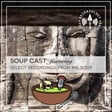
The Curious Case of the Ryedale Hoard & Tik Tok Shopping for Bones!? - WB 22nd Oct 2021
Welcome to Watching Brief. As the name implies, each week Marc (Mr Soup) & Andy Brockman of the Pipeline (Where history is tomorrow's news) cast an eye over news stories, topical media and entertainment and discuss and debate what they find.
Support us on Patreon: https://www.patreon.com/archaeosoup
***
0:00 Introduction
1:33 The Ryedale Hoard
18:05 Selling Human Remains?
20:11 Stephanie Black Interview
***
Link of the Week:
Black History Month:
www.blackhistorymonth.org.uk
***
Links:
Rare Roman Bronzes acquired by the Yorkshire Museum:
Ryedale Ritual Bronzes: Roman artefacts sell for £185,000:
https://www.bbc.co.uk/news/uk-england-york-north-yorkshire-57069434
Yorkshire Museum Buys Ryedale Roman Bronzes from London dealer with help from wealthy donor:
Hanson’s Listing: Ryedale Ritual Bronzes:
https://hansonslive.hansonsauctioneers.co.uk/m/lot-details/index/catalog/153/lot/70029
New York dealer arrested for selling ‘cookie cutter’ manufactured good as authentic antiquities:
Owners urged to claim back heritage centre items:
https://www.inyourarea.co.uk/news/owners-urged-to-claim-back-heritage-centre-items/
Tik Tok User sells human bones, ignites ethical debate online:
https://abcnews.go.com/amp/US/tiktok-user-sells-human-bones-ignites-ethical-debate/story
TikToker selling human bones — including fetus skulls — spark ethics debate:
Selling dead bodies and mortuary artefacts in the UK today: Welbeck Hill:
